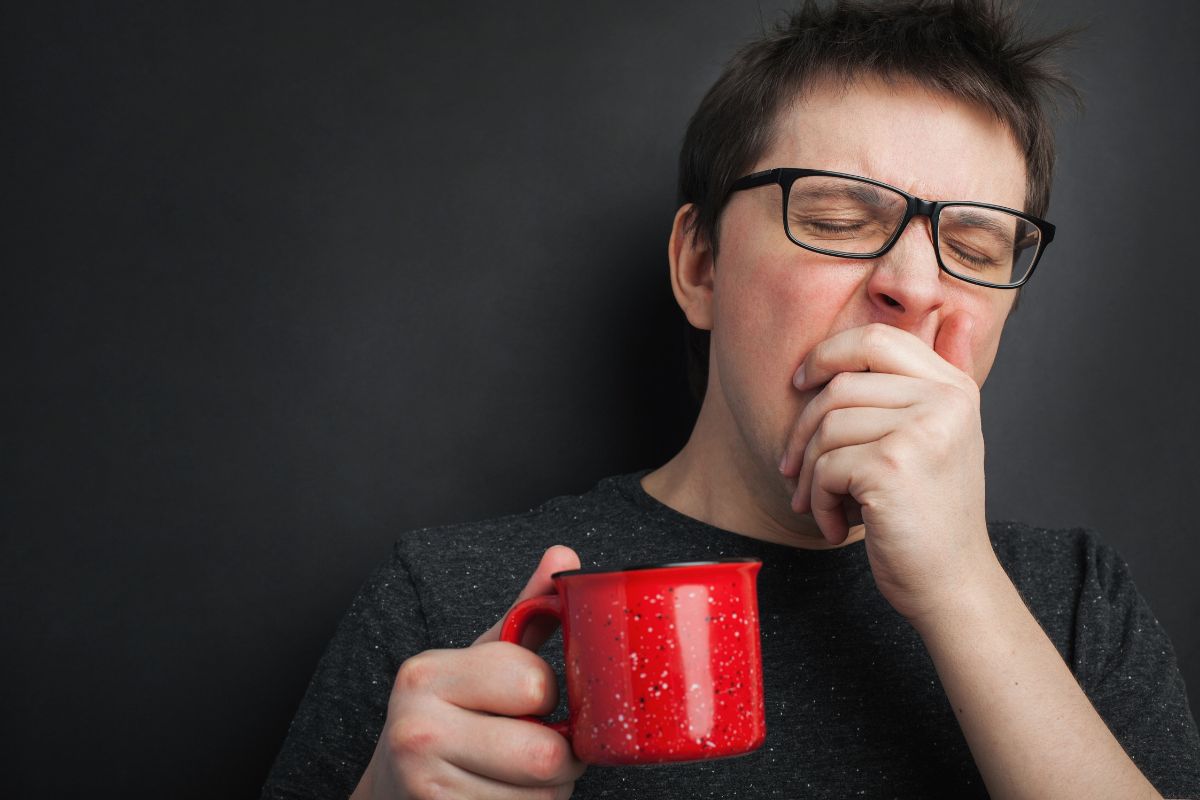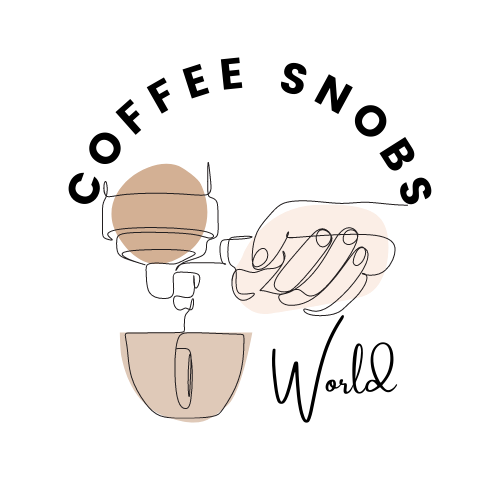Why Doesn’t Coffee Wake Me Up?
You may be a person that pounds coffee in the morning to wake up, but it’s not working. This will make you wonder why doesn’t coffee wake me up?
If this is you, then let’s take a deep dive and see why coffee may not be affecting you. We’ll also answer the question, can caffeine not affect you, and the reasons behind this.

Why Caffeine Isn’t Affecting You
Is the caffeine not working anymore? The answer could be a variety of different reasons why coffee has stopped working for you. Let’s look into some of the possible reasons for this problem.
Lack Of Sleep
It may not be a matter of the coffee not working but that you’re too tired for it to work on you. Coffee is great for helping you wake up, but it can’t work miracles if you aren’t getting enough sleep.
Many of us have had late nights and try to drown ourselves in coffee to try and wake up. But instead of waking up, you’re just tired and jittery from the high volume of caffeine.
Hitting this caffeine threshold is common if you have insomnia or work late nights. The only thing that can fix this is getting some rest.
Caffeine No Effect Or Built Up Tolerance?
How many cups of coffee do you drink per day, and what types of coffee do you drink? The answers to these questions could be the reasons why coffee has stopped working for you.
Coffee works for waking you up, but like with anything, drinking too much can lead to a buildup of tolerance. If you drink multiple cups per day or drink strong coffee like espresso, then you’re going to build a tolerance.
When you drink a high quantity of coffee or a type with high caffeine content, it will eventually stop working. You may have gone too hard on the coffee or any other caffeinated beverages that you like drinking.
Dehydration
If you wonder why doesn’t coffee affect me anymore, the answer could be due to dehydration. Many hardcore coffee drinks pound cups of coffee per day to stay awake and be productive.
A problem with doing this is you’re probably drinking more coffee than water. Coffee is a diuretic, meaning the drink removes fluid from the body. Read our article and find out Is Decaf Coffee a Diuretic.
Drinking high amounts of coffee could actually dehydrate your body. A dehydrated body cannot properly metabolize the coffee to give you the feeling of being awake in the morning.
Sugar Overload
The problem could not be the caffeine in your coffee, but the sugar you’re putting in it. If you’re someone that likes your coffee sweet, this could be the real problem.
A high sugar intake can be the real reason that coffee isn’t waking you up. Not only in the coffee you drink but in everything you eat and drink during the day.
Eating a high volume of sugar and carbs can lead to the dreaded sugar crash. Instead of the usual effect of you feeling up and alert, your blood glucose level drops, and your body crashes.
You could be wondering why the caffeine isn’t working when in reality, you consumed too much sugar.
Genetics
Can caffeine not affect you is a frequently asked question, and the answer is yes. There are many coffee drinkers that are immune to the effects due to their genetics.
Some people have super high metabolisms, where their body’s metabolizing things at a faster rate. This includes caffeine, which means you won’t feel the effects of caffeine like an average person would.
When caffeine metabolizes faster, it doesn’t get the chance to process and have its expected effects on the body. A person with a high metabolism could pound cups of coffee all day and never feel the effects of the stimulant.
On the opposite end of the spectrum, caffeine could make someone actually feel tired after drinking it. Once your body processes the caffeine, it’s normal to feel exhausted afterward.
How Does Caffeine Work?
To fully understand why coffee isn’t working for you, we need to dig a little deeper into caffeine. Here is the science behind how coffee works and what it is.
What is Caffeine?
Caffeine is a central nervous system stimulant. Once this stimulant metabolizes, it increases your alertness, attention, and energy.
How Does Caffeine Work?
When caffeine enters your system, it blocks an organic compound called adenosine from locking into brain receptors. The primary brain receptor that caffeine blocks adenosine from connecting with is the A1 receptor.
When adenosine locks into A1 receptors, it triggers your brain to relax your muscles and make you feel sleepy.
After you consume caffeine, the substance goes to battle with adenosine in your brain. It doesn’t connect to your brain but instead blocks adenosine particles from connecting to A1 receptors.
By caffeine blocking adenosine, this creates bursts of energy that you feel throughout the day. The half-life of caffeine ranges from a few hours to around 10 hours.
Adenosine will then connect to the A1 receptors, and a feeling of sleepiness will wrap over you.
Where is Caffeine Processed?
Caffeine metabolizes in your liver into three different metabolites. Paraxanthine(84%), theobromine(12%). theophylline(4%), and any other remaining traces excrete out into your urine.
A Little Fact About Caffeine?
Caffeine is considered not only a stimulant but also a psychoactive drug. It is by far the most widely used psychoactive drug in the world.
The NIH posted this study in 1998 with shocking results. In western societies, over 80% of adults consume a large amount of caffeine daily.
Far more than alcohol, tobacco, or any illicit drugs used. Caffeine also affects the same brain parts as cocaine but differently.
The Symptoms of Too Much Caffeine
If coffee no longer wakes you up in the morning, there will be some noticeable symptoms. Some of the symptoms of taking too much caffeine include:
- Sleeplessness
- High Heart Rate
- Anxiety
- Insomnia
- Muscle Shakes
- Irritability
- Upset Stomach
- Dehydration
If you are feeling one or more of these symptoms, then it may be time to cut back on the coffee.
How To Fix Coffee Not Working For You
You may feel stressed from the effects of coffee not working for you anymore, but it’s easily fixable. Here are the various ways that will help coffee work for you again.
Drink Less Coffee
The first method you can implement to try and make coffee work for you again is to drink less. Most doctors and nutrition experts state that you shouldn’t go over 400 mg of caffeine per day.
That is about the same as 4 cups of coffee per day. More than likely, why coffee isn’t waking you up is because you consume well over 400 mg of caffeine per day.
You’ve developed a high tolerance to coffee, meaning you need to cut back on the coffee. Try sticking to just 1-2 cups of coffee per day to try and lower your caffeine tolerance.
Drink Weaker Coffee
It may not be that you’re drinking too much coffee, but that you are drinking really strong coffee. Some specialty-made coffees or espressos have more than double the amount of caffeine as regular brewed coffee.
There are some brands like the Black Label by Devil Mountain Brewing Company that is 1500 mg of caffeine per serving! Almost quadruple the recommended intake of caffeine per day!
If you’re someone that loves a strong coffee or espresso, it may be time to switch to something weaker. You need to lower your caffeine tolerance by drinking weaker coffee.
Coffee may never wake you up again if you routinely drink types containing more than 500 mg of caffeine per serving.
Cutback On All Caffeine Drinks
If the caffeine has stopped working, you not only have to cut back on the coffee but all caffeinated drinks. When you have a high demanding job, then chances are that you pound anything down with a high caffeine content.
This means you’re probably going well over the recommended 400 mg of caffeine per day limit. The best thing for you to do is cut back on all caffeinated drinks and not just coffee.
Doing this will help you build your tolerance back up and start to feel the effects of caffeine again.
Cut Out Caffeine Completely
The quickest fix would be to cut out caffeine completely from your diet for a short time. But anyone that’s tried this knows it is easier said than done.
Going a week or more without caffeine can put you into bad withdrawals. Your body is so dependent on coffee that going without it can make you feel even worse.
Although if you can make it through the withdrawals, then coffee should be able to affect you again. Just a small amount of coffee will do the trick to make you feel energized after a tolerance break.
Reduce The Sugar(Or Don’t Add Any At All)
You may not need to reduce the amount of caffeine you consume but the amount of sugar in your diet. Overeating sugar can lead to coffee not working on you and a list of other even worse health problems.
To try and feel the effects of coffee in the morning again, try reducing your daily intake of sugar. If you take your coffee with three spoons of sugar, try taking it with one or none.
You could also try using an artificial sweetener if you just can’t put down a black cup of coffee.
Drink More Water
Drinking more coffee than water will lead to dehydration and your body not functioning properly. That is why you need to make drinking a high level of water a priority every day.
When your body is hydrated, you’re healthier, and your system works as it should with no problems. Everything will work as it should, and coffee will once again wake you up in the mornings.
Get More Sleep
Instead of worrying about why coffee isn’t waking you up anymore, you should focus more on getting proper rest. You could use nearly any substance to wake you up, and after a while, it will stop working.
Not because they don’t work, but because your body is too tired to process them. The most important thing you can do for your overall health is to get a good night of sleep.
Aim to try and get between 6 to 8 hours of sleep per night. This will ensure that your body functions properly, and you’ll feel less fatigue throughout the day.
You also won’t have to worry about coffee not waking you up in the morning.
Switch To Tea
Another option you have is to lower your high caffeine tolerance is to switch to tea. Most teas do not contain caffeine, and some types can even help you wake up like a cup of coffee.
Some types of teas that are known to give you energy that you can try include:
- Black Tea
- Green Tea
- Mate Tea
- Peppermint Tea
- Ginseng & Lemon Tea

The Correlation Between Coffee And ADHD
The studies on the correlation between coffee and ADHD haven’t had conclusive results. Those tested had various symptoms, which didn’t give researchers a solid answer.
However, there are some interesting correlations between coffee and those that suffer from ADHD. Let’s look at some of the positive and negative effects that coffee has on people with Attention Deficit Hyper-Activity Disorder.
The Positive Effects Of Coffee On Those With ADHD
One reported positive effect of coffee on adults with ADHD is a slight boost to focus concentration. Similar to the effects of ADHD meds like Adderall, but a far lighter version.
This is not to say that coffee or anything with caffeine is an alternative to ADHD meds.
The other positive effect that caffeine could have on someone with ADHD is improved memory. Some believe they can retain information better and remember things if they use a small amount of caffeine.
The Negative Effects Of Coffee On Those With ADHD
Coffee and ADHD can be a dangerous combination if someone with this disorder consumes too much of the drink –especially when mixed with ADHD medication.
When you consume coffee and ADHD meds at the same time, this creates an effect called synergy. This is when two drugs that have the same mechanisms of action come together to create a more powerful effect.
Not only would the impact of the drugs feel stronger, but also the potential side effects from ADHD meds.
Some of the worst possible side effects include:
- Sleeping Problems/Insomnia
- Mood Swings
- Severe Headaches
- Nausea
- Increased Blood Pressure
- No Appetite
If you’re on ADHD medication that gives you any of these side effects, you may need to stay away from caffeinated drinks.

The ADHD & Coffee Myth
There is a common myth about ADHD and coffee. That is that coffee makes some people sleepy, which leads them to believe that they have ADHD.
It is a completely fabricated myth that can make people believe they have ADHD. There’s no evidence behind this claim, and making a self-diagnosis from it is reckless and dangerous to your health.
Can Those With ADHD Consume Coffee?
Doctors recommend that those who have ADHD only consume caffeinated drinks during the morning hours. Drinking anything with caffeine late in the evening can have horrible side effects on those with this disorder.
It can lead to sleep deprivation, leading to various symptoms—everything from irritability, forgetfulness, loss of focus, and inability to control emotions.
You should be okay drinking just one cup of coffee if you take ADHD meds but never overdo it.
The Final Word
Drinking too much coffee will lead to a high caffeine tolerance, and it will eventually stop waking you up. Substances like coffee and caffeine are things you must consume in moderation.
By not overdoing it with the coffee, staying hydrated, and getting sleep, coffee will definitely wake you up in the morning.

